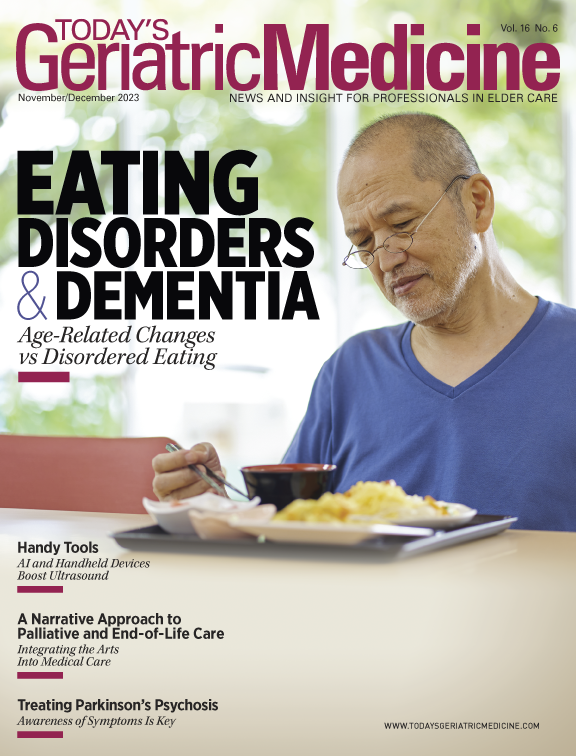
November/December 2023
Menopause: Hot Flashes, Memory, and Heart Health The Link Between Common Menopausal Symptoms and Women’s Health The belief that hot flashes are a benign symptom of the menopausal transition is being challenged by new research revealing that there’s likely more clinical significance to this occurrence than previously thought. Researchers have found that menopausal vasomotor symptoms (VMS), including hot flashes and night sweats, may have a link to both brain and heart health in women. Thus, it’s important for the medical community to begin looking at VMS as more than an inconvenience for aging women. Hot flashes are defined as the sudden feeling of warmth in the upper body (usually most intense over the chest, neck, and face) sometimes accompanied by flushing. Women describe feeling a sudden flare of heat and, as a result, commonly experience sweating. When these symptoms occur at night, they are called night sweats. It’s not uncommon for women to describe these symptoms as uncomfortable—and potentially as even having a negative impact on their daily lives. But up until recently, VMS have often been dismissed as a “normal part of aging.” Unfortunately, overlooking these symptoms could actually be a disservice to women’s health. That’s because hot flashes and night sweats could potentially be a red flag for underlying health conditions, explains Rebecca C. Thurston, PhD, Pittsburgh Foundation Chair in women’s health and dementia and a professor of psychiatry, clinical and translational science, epidemiology and psychology at University of Pittsburgh. She has been studying the link between VMS and women’s heart and brain health, and her research has shown there are good reasons to rethink the way the medical community approaches VMS. Looking at the Data Since more than 70% of women commonly experience VMS—which are frequent and severe in roughly one-third of that total—these findings have far-reaching implications and, Thurston says, underscore the importance of monitoring cardiovascular risk factors closely in those who experience VMS. More recently, Thurston has also made a connection between hot flashes and brain health. A study published in the January 2023 issue of Neurology found that VMS—particularly VMS occurring during sleep (night sweats)—were associated with greater white matter hyperintensities (WMHs) in women. Larger WMH volume has been linked to Alzheimer’s disease and cognitive decline. Looking at specific brain regions, Thurston observes that VMS were associated with frontal lobe WMH volume, which is significant as the frontal lobe is particularly sensitive to cardiovascular disease risk factors. This supports the idea that there’s a vascular component to VMS. All of this is changing the way the medical community looks at side effects of menopause. Consequently, the age norms associated with menopause are also evolving. A Mayo Clinic study published in Menopause: The Journal of the North American Menopause Society showed that women reported VMS well into their 60s, 70s, and even 80s. Preventative Care Starts in Middle Life “We’re realizing that what we see at midlife can have implications for women’s health well into their later years,” she says. “We know that to prevent cardiovascular disease, which emerges typically in women’s 70s and later, we need to start cardiovascular disease prevention as early in life as possible. Midlife is an excellent time to engage in these preventative efforts.” Despite the causal links, Thurston says, it’s not yet known whether treating hot flashes will improve cardiovascular and brain health. “But we do know that controlling other risk factors can improve cardiovascular and brain health,” she continues. “Hot flashes can signal those women who need some increased attention.” In this way, according to Thurston, hot flashes serve as a potential “midlife marker” of brain and cardiovascular health—and doctors should pay attention. “At the present time, doctors should view frequent or persistent hot flashes as potential indicators of adverse underlying vascular health and be sure to engage in all of the standard cardiovascular risk reduction efforts with women who have them,” she advises. “This includes control of standard risk factors such as hypertension, dyslipidemia, and insulin resistance, as well as supporting their patients in adopting all of those positive health behaviors, such as diet, exercise, and smoking cessation that we know are so important for cardiovascular and brain health as we age. Making these behavioral changes is not easy, but is so important, so ongoing support and follow up from health care providers is critical.” Looking Ahead “We are increasingly considering not only what hot flashes mean for women’s cardiovascular health but also what hot flashes may mean for women’s brain health,” she says. “We would also like to better understand what mechanisms underlie relationships to women’s cardiovascular and brain health as well as whether treating them impacts women’s health.” — Lindsey Getz is an award-winning freelance writer in Royersford, Pennsylvania.
Does HRT Increase Dementia Risk? In the study, researchers looked at data from health registries of more than 55,800 women and concluded that HRT was positively associated with Alzheimer’s disease and other forms of dementia, even in women who received treatment at the age of 55 years or younger. However, researchers also stressed that further studies would be needed to determine whether there was an actual causal effect of HRT or whether these women were already predisposed to develop dementia. Instead, there may be a link between vasomotor symptoms and dementia, and these same women coincidentally start HRT. With more research needed, it’s important that doctors help patients make the best decision for their health on a case-by-case basis. |
